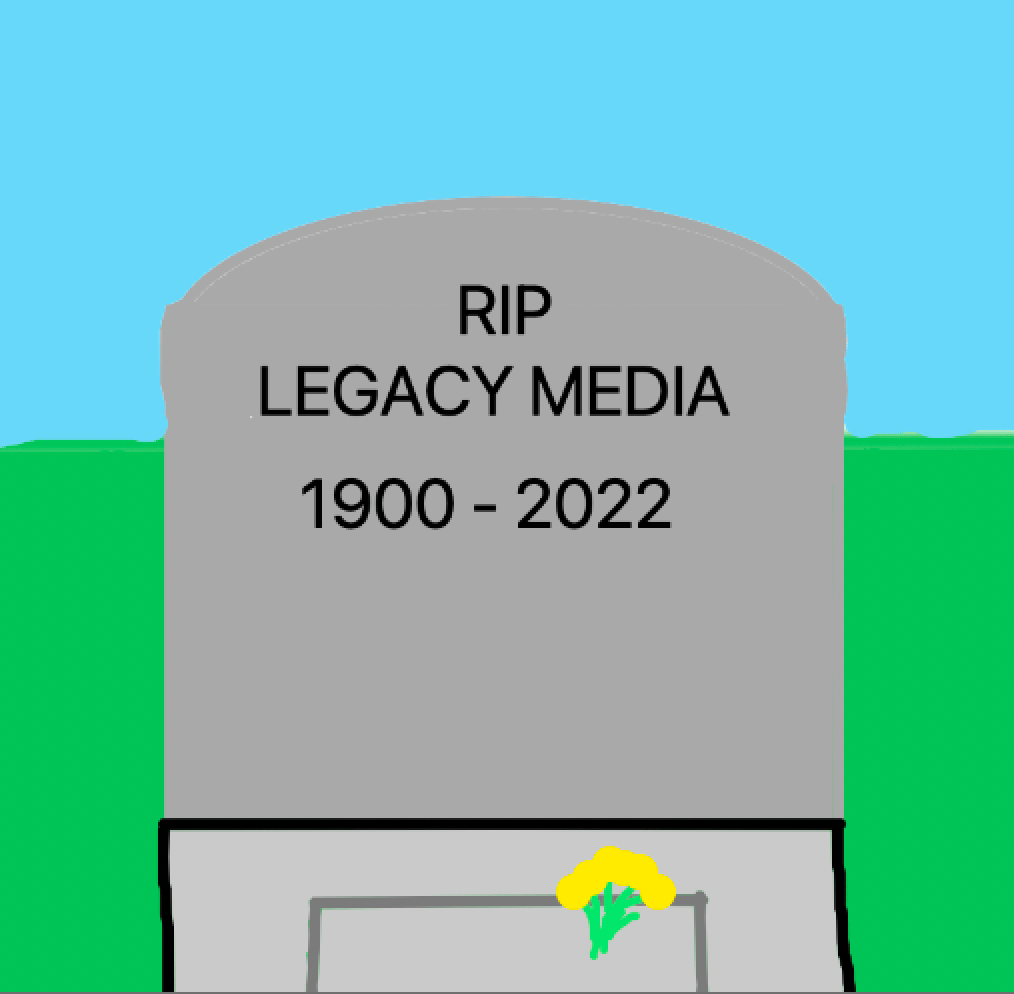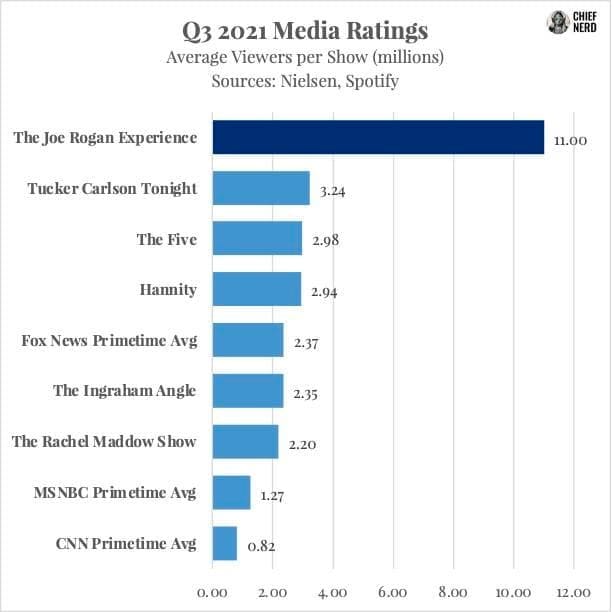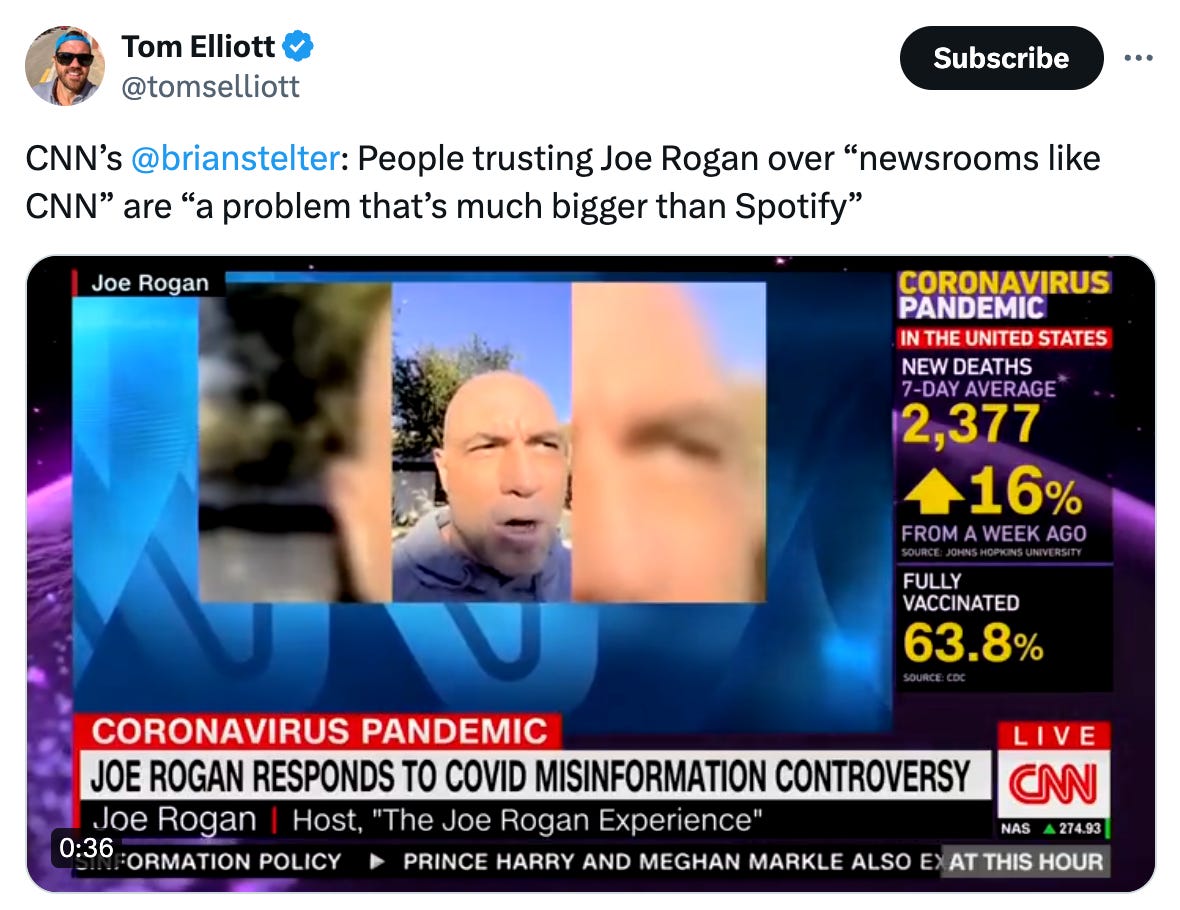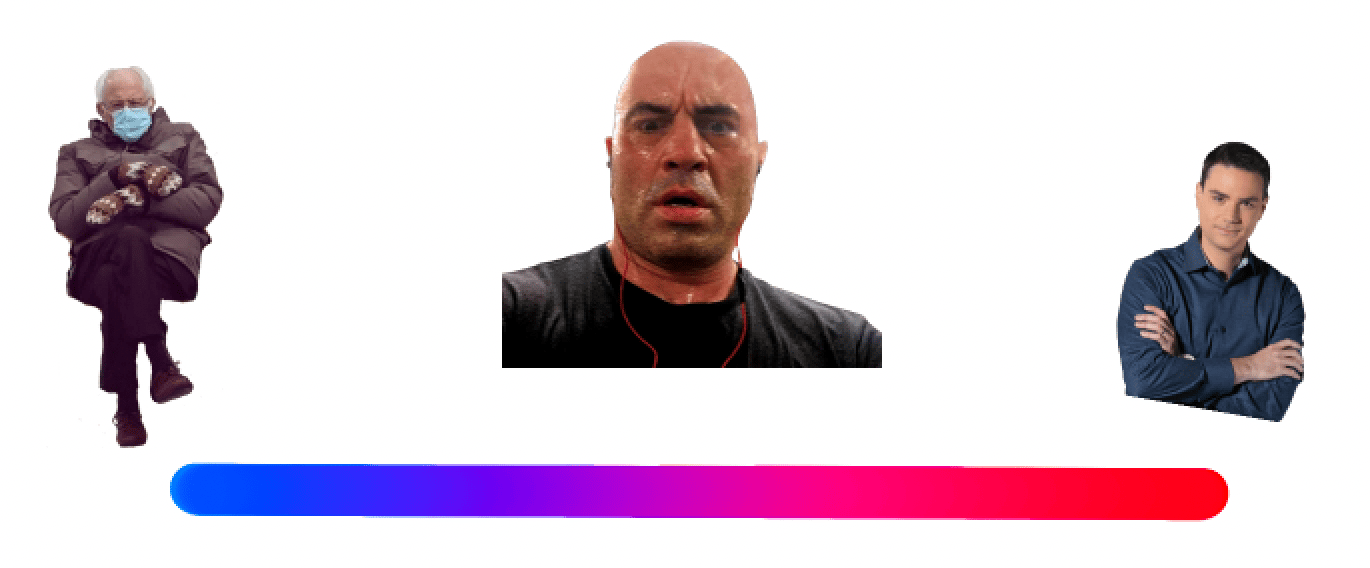Welcome to Young Money! If you’re new here, you can join the tens of thousands of subscribers receiving my essays each week by adding your email below.
The last two decades have been defined by generational changes. Today's cell phones are more powerful than the computers that put man on the moon. Our jobs are no longer geographically constrained. Financial markets are available to the masses.
The next decade will bring its own wave of changes as well.
Electric cars. Interplanetary travel. Life changing medicines. And countless other shifts that I cannot possibly predict.
However, I think the biggest shift isn't going to be a technological revolution. It will be a media revolution.
Let's dive in.
The World Is (Allegedly) Burning to the Ground
Let me take two paragraphs to discuss the current state of the media:
After work, kick back in your recliner and turn on Fox for a couple of hours. You will hear two hours of "Joe Biden is too old to be the president and he is the worst leader of all time," "America is a communist regime and we need to get back to our roots," "The economy is dead because of our poor leadership," and "every blue city is a dumpster fire."
After work, kick back in your recliner and turn on CNN for a couple of hours. You will hear two hours of "Republicans are trying to kill us because they won't wear masks." "We need to trust the science." "Donald Trump still sucks." "Joe Rogan is worse than Hitler."
Here's a thought experiment: what was the last positive story that you heard on a mainstream media site? Actually, that bar is too high. What was the last interesting story that didn't double as a hit piece against someone else? Can't think of anything? Neither can I. This isn't hyperbole. Don't believe me?
Here is a screenshot of the headlines from Fox's website.
MASK MANDATES! BLUE STATE'S SURGING HOMICIDES! VETERAN GUNNED DOWN!
Oh but don't worry! CNN is much better.
COVID MANDATES! NORTH KOREA MISSILES! CATHOLIC SEX ABUSE CASES!
I mean dude, you would think we were on the verge of systemic collapse.
Last fall, I backpacked Europe for four months. Apparently, it was a perilous endeavor. According to CNN, I was walking face first into the Bubonic Plague. According to Fox, I was venturing into a continent of Draconian regimes.
Anyway, here's a photo dump from my journey into the apocalypse.
Color me shocked, and I mean shocked, that I made it out alive. Not only did I survive, but I met a ton of nice people, didn't have any near death experiences, and saw a lot of cool stuff.
It's almost like... I don't know... the world isn't that bad of a place? It certainly isn't the hellscape that we keep seeing on our 6:00 news.
So pardon my French, but legacy media sucks. The question is, why does it suck? And what's next?
Why Legacy Media Sucks
No one actually enjoys talking about politics. This is largely because you can't "win" a political argument due to the subjective nature of politics.
Political arguments between friends end in awkward draws. Political arguments online devolve into toxic cesspools. Even debates between presidential candidates don't produce winners, one candidate merely loses by less than the other in the public eye.
Yet somehow, politics have become a mainstay in every traditional media source. CNN is liberal. Fox is conservative. This isn't some secret. Companies that say they aren't political really just mean that they don't currently agree with the party in power.
The biggest problem with mixing politics and news? All of your content ends up leaning left or right. Articles and interviews look to persuade, not inform. The 6:00 news spends less time discussing what happened, and more time discussing why it happened.
So color me shocked, and I mean shocked, that news viewership has been dismal.
I have listened to a total of two (2) Rogan episodes ever. One where he interviewed an escapee from North Korea, and one where he interviewed Elon Musk. Just three hours of thought-provoking conversations. I'm hardly a fanboi, but both were incredibly entertaining.
On the flip side, I have watched plenty of Tucker Carlson, Hannity, Fox, CNN, and MSNBC. The content is all the same. Two hours of dunk-fests and fear porn. Obviously the antagonists change with the program, but all of the content provokes the same emotions: anxiety, anger, conceit, and hopelessness.
"The world is going to shit, and it's those people's fault."
And legacy media interviews serve one purpose: confirmation bias. You either interview a smart person who shares your view, or you dunk on someone who disagrees. Rinse, repeat.
It's actually impressive how these companies have managed to create 24/7 news cycles about how those with differing beliefs are ruining the world.
It's not exactly quality entertainment, and it's no surprise that no one under the age of 50 is watching this stuff anymore. Yet the people working in legacy media are dumbstruck. Check out this clip of CNN's Brian Stelter discussing Joe Rogan's apology.
The clip starts with Rogan saying that he "wants to show all kinds of opinions" on his podcast.
It then cuts over to Stelter, who responds to Rogan's video by saying Rogan's answer sounds great, "but not all opinions are created equal." Brian then goes on a flustered rant about real newsrooms like CNN having resources like "health departments, operations, and newsrooms that work hard on verifying information," and the real problem is "figures like Rogan are trusted by people who don't trust real newsrooms".
lol. lmao.
The cognitive dissonance on display here is wild stuff, let's break it down.
Podcast host Joe Rogan says he wants a variety of opinions. CNN host Brian Stelter casually says that not all opinions are created equal (🚩🚩🚩) before calling people who trust Rogan over real newsrooms the real problem.
Idk man. In my humble, frontal lobe not-quite-developed 24 year-old mind, I don't want the 6:00 news anchor determining which opinions are more equal than others. But that's just me.
See the thing about Rogan, Lex Fridman, and a ton of other independent podcasters is that they bring all sorts of guests on. Rogan interviewed (and endorsed) Bernie Sanders NARRATIVE VIOLATION. He also interviewed Ben Shapiro. I don't think it's possible to get more diversity of thought than that.
And it's not like there's some script, or underlying motive, or anything going on. The episodes are just people talking about stuff.
Meanwhile, Jesse Waters dunks on 20-year old liberal arts majors on Fox, and Chris Cuomo berates Florida's governor while his own brother was busy harassing 20-year old staffers.
In life, there are three types of games:
positive-sum games, where 1+1 = 3
zero-sum games, where 1+1 = 2
negative-sum games, where 1+1 = 1
Uplifting others and/or debating to find truth is positive sum. Debating with neither side willing to accept new information is zero sum. One-sided arguments that don't let the opposition speak are negative sum.
Legacy media has largely devolved to choice C. Sure, the instigator "wins" negative-sum games. But when you "win" an argument that no one wanted to listen to in the first place, you risk losing your audience.
Is anyone really surprised that an industry that monetizes negative emotions and outrage is being usurped by more interesting content?
New Sources
Earlier this week, beehiiv CEO and all-around chill guy Tyler Denk went on Joe Sweeny's Just Raised podcast to talk about what he's building at beehiiv and where he sees the media landscape moving. The episode is linked below for those curious, it was a good listen.
It was cool hearing Tyler discuss the future of beehiiv, as I use beehiiv for my newsletters. However, his thoughts on the future of the media landscape really piqued my curiosity.
In reference to media incumbents, Tyler said that he can't remember the last time he went to Fox News or any other big media site to look up information about anything.
After thinking about it for a while, I realized that I can't either. On top of that, I'm not subscribed to the Wall Street Journal, New York Times, Washington Post, or any other large publications. Between paywalls, click-baity advertisements, and underlying political tones, the content isn't that great.
I am subscribed to like seven newsletters though.
Exec Sum by Litquidity: headlines, markets, memes
Morning Brew: business stories from around the country
Huddle Up by Joe Pompliano: sports
Not Boring by Packy McCormick: tech trends and interesting companies
Money Stuff by Matt Levine: Daily recap of something happening in the world of business
SatPost by Trung Phan: Interesting and funny stories from a variety of industries
Doomberg: Factual reporting on macroeconomic news from around the world
None of these newsletters are paywalled, though I would be much more inclined to pay for a subscription to one of my favorite writers than pay the equivalent amount to a large corporation.
None of these newsletters are clickbaity, though some do have sponsored advertisements at the beginning. However, one paragraph and a small photo is much less distracting than 27 pop up tabs that cover the article.
But the biggest difference? traditional media tries to disguise their stories as facts. These newsletters aren't using cloak and dagger. When Packy McCormick gives his opinion on something, he openly admits that it's just his opinion. When the Morning Brew breaks down what is going on with covid restrictions, they are just reporting the restrictions. Facts are facts. Stories are stories. Opinions are opinions. It's more "what's going on" and not "what should be going on".
Brian Stelter said the problem is "figures like Rogan are trusted by people who don't trust real newsrooms".
The real problem is that there hasn't been a real newsroom in 50 years. Journalistic integrity was replaced by political leanings. Reporting the facts took a backseat to influencing public opinion. People are sick of it. If I have to choose between listening to the guy interviewing rocket scientists about alien life and the news anchor spending three hours explaining why the SAT is now racist, where do you think I'm going to spend my time?
It isn't (or in this case is) rocket science.
Power to the Players
For a century, large corporations had an oligopoly on media.
The only way to "make it" as a journalist was to work for a large publication. If you wanted to write about finance, you better work for Forbes. If you wanted to conduct live interviews, you had to be a news anchor. You wanted people to watch your video footage? Good luck without a connection at ABC.
But now anyone can start a newsletter, podcast, or YouTube channel. And if their content is good, they will build an audience.
Substack authors make half a million a year. Podcast hosts are signing $100M deals. YouTube travel Vloggers make a living by doing cool stuff in exotic countries.
For the first time, you don't have to work for a big name to create content. You don't have to work for a media company to build an audience. In fact, you can make more money by working for yourself if you're good.
With 10,000-15,000 newsletter subscribers and decent engagement, you can make $100,000+ from advertisement revenue by publishing 2-3 pieces per week. I know some creators are making millions from ads alone. Alternatively, with just 1,000 subscribers paying $10 a month, you can make $120,000 a year. 10,000 paying subscribers? You're a millionaire.
Another benefit of building your own brand? No approval needed. You don't have to worry about how your article will impact your brand's image.
Don't get me wrong, working for a large publication does bring one massive advantage: a guaranteed audience. But what's the tradeoff? Your money, your time, and your creativity.
While writing for a larger company, you will either earn a salary with capped upside, or a revenue share based on views/ad clicks. You will have deadlines that you have to hit, and you will be limited on the scope of topics you can write about.
You're sacrificing your freedom for stability, but that stability comes with limited upside. The most successful creators are no longer working for Fox, Forbes, and ESPN. They are working for themselves.
Pat McAfee signed a $100M+ deal with FanDuel
Joe Rogan signed a $100M deal with Spotify
Alex Cooper signed a $60M deal with Spotify
Litquidity turned a meme page into a multi-million dollar business
The Morning Brew cashed out for $75M
Packy McCormick makes millions and built a Venture Capital arm from a newsletter
Independent creators produce better content and make more money. A win-win for them and their audiences.
While traditional media leaned further and further into clickbait, polarization, and politics, new creators ate away at their audiences. The incumbents' responses haven't been pretty.
No one under 50 is watching the news anymore, as we can get our information from the Twitter, newsletters, podcasts, and YouTube. Because they are losing the battle for attention, traditional media has resorted to provoke our emotions through polarizing articles, politically charged reporting, and fear porn.
Audience members who are scared, angry, and anxious will keep coming back, I suppose. But like I mentioned earlier, some readers will grow frustrated and leave. With a million other options, why should they stay?
The audiences that remain grow louder and more polarized, and the companies double down on volatile content. What do you think happens when media companies continue producing increasingly polarizing content in their collective struggle to survive?
You have citizens that disagree with election results. That haven't left their houses in two years. That think the vaccine is a hoax. That think they need 12 booster shots to survive. That think any disagreement is a violation of their safe space. That storm the Capitol. That advocate for the censorship of opinions that make them uncomfortable.
Ironically, the media will blame everyone except for themselves.
Sound familiar?
Wrapping Up
I welcome the sensationalization of legacy media. The more extreme their headlines, the more they attempt to influence our emotions, the more people will realize to leave them for good.
Creators are building their own platforms, and audiences are following them. As creator audiences grow larger, and media influence grows smaller, where will the advertising dollars go?
Fear and coercion may work in the short-term, but optimism and curiosity will win out in the end. So here's to those playing positive-sum games. Those creating content that people love, on their own terms. They are the future of media, and I am so here for it.
- Jack
I appreciate reader feedback, so if you enjoyed today’s piece, let me know with a like or comment at the bottom of this page!
Young Money is now an ad-free, reader-supported publication. This structure has created a better experience for both the reader and the writer, and it allows me to focus on producing good work instead of managing ad placements. In addition to helping support my newsletter, paid subscribers get access to additional content, including Q&As, book reviews, and more. If you’re a long-time reader who would like to further support Young Money, you can do so by clicking below. Thanks!










